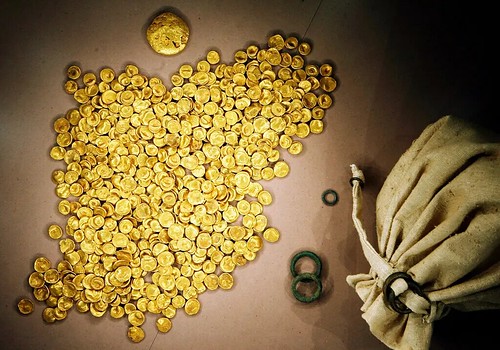
PREV ARTICLE
NEXT ARTICLE
FULL ISSUE
PREV FULL ISSUE
CELTIC GOLD HOARD THEFT ARRESTSHoward Berlin passed along an article about arrests in Germany related to an earlier museum Celtic gold hoard theft. Thanks. I'm having trouble accessing the article (linked below from dw.com), but here are excerpts from other reports. -Editor The break-in looked like the work of professionals. It began after midnight on Nov. 22, 2022, when someone cut fiber optic cables at a telecommunications center in the small German town of Manching, in Bavaria, knocking out internet and telephone connections in 13,000 households. Then, just before 1:30 a.m., the Celtic and Roman Museum was broken into. Within nine minutes, thieves had pried open two locked doors and a display case, the police said. One official said the coins, along with a chunk of gold that was also stolen, could be worth $1.7 million, although much less if melted down. On Thursday, the Bavarian state criminal police said that they had arrested four men suspected of carrying out the theft after a monthslong investigation by a 25-member task force turned up a trace of DNA on an unspecified item at the scene. The deputy head of Bavaria's state criminal police office, Guido Limmer, told reporters in Munich that the authorities had examined 18 lumps of gold that were recovered this week, The Associated Press reported. Each is believed to be the result of four coins being melted down, he said.
The coins had been unearthed in 1999 during a dig at an ancient Celtic settlement known as the Oppidum of Manching. The trove is considered the biggest cache of ancient Celtic gold discovered in the 20th century. It remains a mystery why so much gold was stored in one spot and how it ended up at the site. The coins were the pride of the Celtic and Roman Museum, a small archaeological institution that showcased them and other artifacts discovered in the region.
To read the complete article, see:
To read the other articles, see:
Wayne Homren, Editor The Numismatic Bibliomania Society is a non-profit organization promoting numismatic literature. See our web site at coinbooks.org. To submit items for publication in The E-Sylum, write to the Editor at this address: whomren@gmail.com To subscribe go to: https://my.binhost.com/lists/listinfo/esylum All Rights Reserved. NBS Home Page Contact the NBS webmaster 
|


